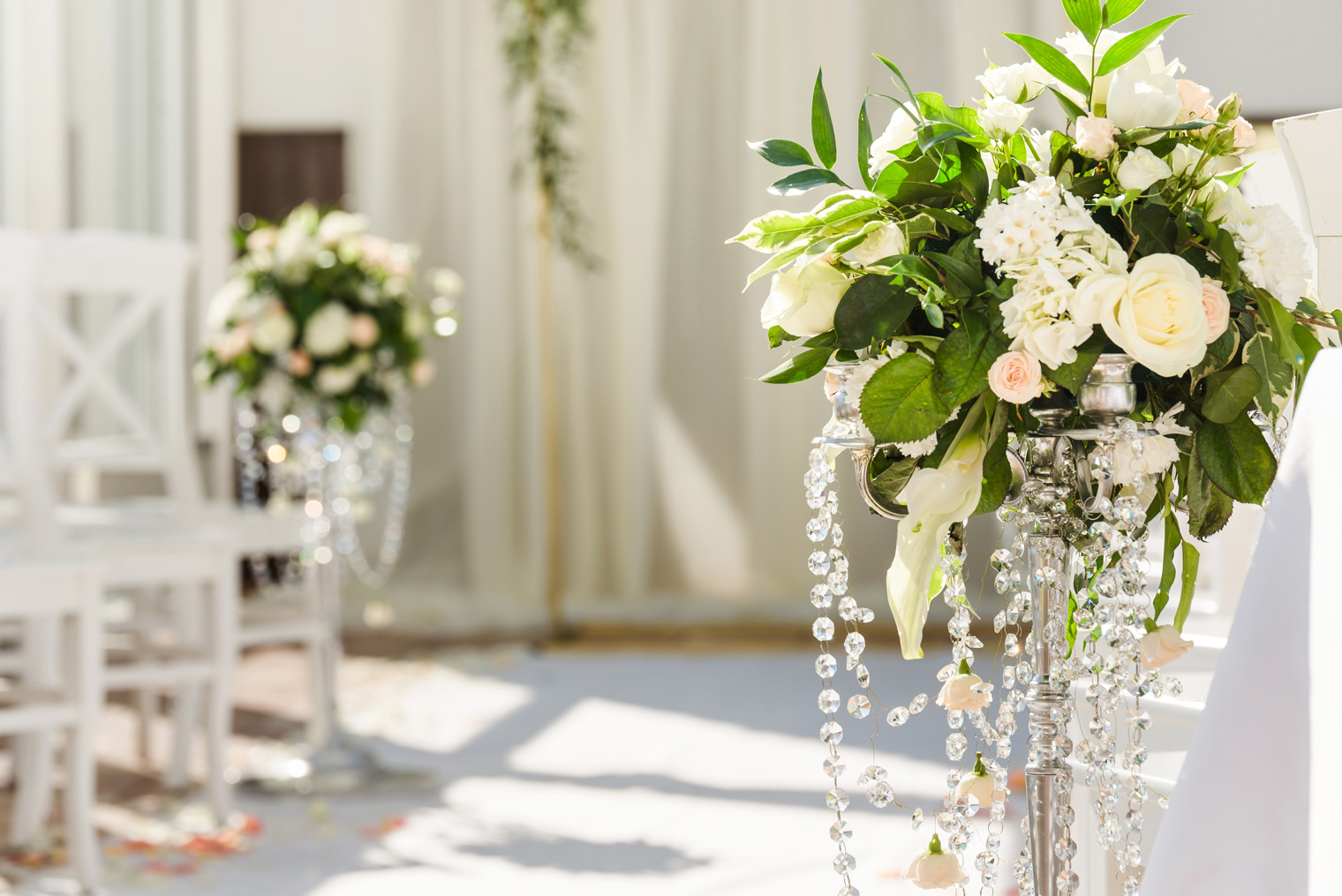Planning a destination wedding is all about finding the perfect blend of romance, beauty, and timing. The Dominican Republic, with its pristine beaches, lush tropical landscapes, and world-class resorts, has long been a favorite for couples dreaming of saying “I do” in paradise. But one of the most important decisions you’ll need to make is choosing the best time of year to celebrate. From sunny dry-season days to vibrant cultural festivals, the timing of your wedding can shape the entire experience for you and your guests. In this guide, we’ll explore the weather by season, tips for selecting your ideal date, and special events to keep in mind, so you can plan the perfect Dominican Republic destination wedding.
Weather and Climate in the Dominican Republic
Winter (December to February)
Winter is one of the most popular seasons for a destination wedding in the Dominican Republic. During this time, the island enjoys dry, sunny days with comfortably warm temperatures ranging from 75°F to 85°F (24°C to 29°C). Humidity is lower, and rain is minimal, making it ideal for outdoor ceremonies, beachfront receptions, and scenic photo shoots. Many couples from colder climates choose this season to escape winter and celebrate in paradise.
The pleasant weather also means that winter is part of the Dominican Republic's peak tourist season. While this ensures that resorts and venues are operating at full capacity with plenty of activities and services available, it also means higher prices and increased demand. Couples planning a winter wedding should book venues, accommodations, and vendors well in advance to secure availability and avoid premium rates during the holiday weeks around Christmas and New Year's.
Despite the increased activity, the ambiance during the winter season is festive and romantic. From twinkling lights in resort gardens to clear, starry skies at night, the setting is naturally enchanting. If you’re dreaming of a sunny yet temperate wedding day without the worry of sudden rain, winter is one of the safest and most beautiful times to say "I do" in the Dominican Republic.
Spring (March to May)
Spring offers a sweet spot for destination weddings in the Caribbean. The weather remains mostly dry and warm through March and April, with a slight increase in humidity as May approaches. Average temperatures range between 76°F and 87°F (24°C to 30°C), and the blooming tropical flora adds a vibrant, colorful touch to outdoor wedding décor and photos.
March and April are especially ideal for couples who want the benefits of dry season weather but hope to avoid the high prices and crowds of peak winter months. As local festivals begin and the country welcomes spring with music, dance, and culture, there’s also an added layer of joy and celebration in the air that can enhance your guests’ experience. However, it’s important to note that Easter and Spring Break may attract more tourists, so securing your wedding bookings early is still advisable.
By late May, the rainy season begins to creep in, bringing brief afternoon showers and more cloud coverage. While this doesn’t necessarily rule out weddings, you’ll want to have contingency plans for outdoor events and perhaps consider venues with covered terraces or beachside pavilions. If timed right, a spring wedding can deliver stunning weather with just the right balance of intimacy and excitement.
Summer (June to August)
Summer in the Dominican Republic is hot, sunny, and lively—but also more unpredictable when it comes to weather. Temperatures climb to the high 80s and low 90s (31°C to 33°C), with high humidity and increased chances of rain. Despite being the beginning of the official hurricane season, serious storms are rare in early summer, and many summer weddings still go off without a hitch.
This season appeals to couples seeking vibrant tropical vibes, lush greenery, and longer daylight hours. Summer weddings often feature dramatic sunsets, warm ocean water, and the full glory of Caribbean nature. To keep guests comfortable, it’s best to plan ceremonies for early morning or late afternoon and consider offering cooling stations or shade.
One advantage of a summer wedding is that many resorts offer lower rates and more availability, especially in June and July before hurricane season peaks. If you're flexible and prepared with weather backup plans, summer can be a stunning and cost-effective time to host your big day with the help of a Dominican Republic wedding planner.
Fall (September to November)
Fall is the quietest and most budget-friendly time of year for a destination wedding in the Dominican Republic, but it comes with weather-related risks. This period marks the heart of hurricane season, with September being the most active month. While full-blown hurricanes are infrequent, tropical storms and heavy rains can occur, potentially affecting travel and event logistics.
That said, many couples successfully marry during the fall by working closely with local planners to have solid contingency plans in place. Resorts tend to be less crowded, providing a more private and serene atmosphere for your celebration. Many venues offer discounts or added perks during this season, making it an attractive option for couples on a budget or those seeking a more intimate event.
Fall also brings a unique mood to the landscape. The lush, rain-fed surroundings are at their greenest, and cloudy skies can actually make for stunning, moody wedding photos. If you're the kind of couple who doesn’t mind a little spontaneity, a fall wedding can be memorable, romantic, and cost-effective—with the right preparation.
Tips for Choosing the Best Time
When choosing the best time for your Dominican Republic destination wedding, start by identifying your top priorities. If perfect weather is your biggest concern, aim for the dry season between December and April, when rain is scarce and temperatures are mild. However, keep in mind that this is also the peak tourist season, which means higher prices for flights, hotels, and venues. Booking well in advance is essential, and flexibility with weekday ceremonies can sometimes help reduce costs and availability issues.
Budget-conscious couples might prefer the shoulder months—May, early June, or November—which offer a nice balance between affordability and decent weather. During these periods, you can take advantage of lower rates while still enjoying sunny skies and manageable humidity. However, it’s wise to consult with a local wedding coordinator about specific weather patterns in your chosen location, as conditions can vary by region. Having a rain backup plan is also a smart move during these months.
Another key factor to consider is your guests’ availability and travel preferences. Many people are more likely to take time off during holiday breaks, long weekends, or school vacations, which could make a winter or summer wedding more appealing. However, this can also mean competing with higher travel costs. Balancing your dream date with guest convenience, budget, and seasonal weather patterns will help you land on the ideal wedding window that brings your vision to life while making it easy and enjoyable for your loved ones to attend.
Special Events and Festivals to Consider
When planning your destination wedding in the Dominican Republic, it's important to be aware of local festivals and holidays that might overlap with your chosen dates. Events like Semana Santa (Holy Week), typically in March or April, are deeply rooted in Dominican culture and can impact everything from availability of accommodations to local traffic. While this time offers an authentic cultural experience, it also brings large crowds, especially in beach destinations, as both locals and tourists travel throughout the country. Booking during this period may be more expensive and logistically challenging, so careful planning is key.
On the flip side, incorporating a local festival into your wedding week itinerary can enhance your guests’ experience and make your celebration even more memorable. For example, Carnival—celebrated throughout February—brings vibrant parades, music, and dance to cities across the island, particularly in La Vega and Santo Domingo. If your wedding aligns with these festivities, guests can immerse themselves in Dominican traditions, adding an extra layer of excitement and cultural depth to your wedding celebration. Just be sure to check which regions celebrate more prominently, as it may affect hotel availability and noise levels near your venue.
Other noteworthy dates include Dominican Independence Day on February 27th, Merengue Festival in Santo Domingo (typically held in July or August), and various patron saint celebrations in smaller towns throughout the year. While these events might not directly interfere with your wedding, they could influence pricing, vendor availability, and travel logistics. Consulting with a local wedding planner in the Dominican Republic who understands the calendar of national events can help you avoid unexpected surprises—or take advantage of them for an unforgettable wedding celebration.
Conclusion
Planning a destination wedding in the Dominican Republic is an exciting journey filled with endless beauty, vibrant culture, and unforgettable experiences. But choosing the best time of year is one of the most important decisions you'll make in the planning process. From the sun-soaked days of winter to the lush, romantic atmosphere of fall, each season offers something unique depending on your priorities, whether it's perfect weather, budget flexibility, or guest convenience.
By understanding the island’s climate patterns and weighing the pros and cons of each season, you can make an informed choice that suits your style and wedding vision. Whether you want a beachfront ceremony under clear blue skies or a lush garden celebration surrounded by tropical greenery, the Dominican Republic offers a magical backdrop year-round—with just a little strategic planning. Don’t forget to factor in key considerations like travel costs, vendor availability, and weather contingency plans if you’re choosing a date outside the dry season.
Ultimately, the best time for your destination wedding is the one that aligns with your personal preferences, love story, and the experience you want to create for your guests. With its warm hospitality, breathtaking venues, and rich natural beauty, the Dominican Republic will make your celebration unforgettable—no matter when you decide to say "I do."
Blog
Inspiration for Your Events





FAQs
Find answers to your most pressing questions about planning your dream event in the Dominican Republic.
To make your event memorable, consider incorporating a variety of activities:
- Local Entertainment: Hire local musicians or dancers to showcase Dominican culture.
- Workshops: Offer workshops on local crafts or cooking classes to engage guests.
- Excursions: Plan group excursions to explore the beautiful landscapes and attractions of the Dominican Republic.
These activities can enhance the overall experience and create lasting memories for your guests.
When planning an event in the Dominican Republic, it's important to be aware of the legal requirements:
- Permits: Depending on the type of event, you may need to obtain permits from local authorities.
- Insurance: Consider event insurance to protect against unforeseen circumstances.
- Contracts: Always have contracts in place with vendors to ensure clarity and protection for both parties.
Consulting with a local event planner can help navigate these requirements smoothly.
Selecting the right caterer is crucial for the success of your event. Here are some tips:
- Research: Look for caterers with experience in event planning and positive reviews.
- Tastings: Schedule tastings to sample their menu options.
- Flexibility: Ensure the caterer can accommodate dietary restrictions and preferences.
Don't hesitate to ask for references and check their previous work to ensure they align with your vision.
The Dominican Republic boasts a variety of venues suitable for different types of events, from beachside resorts to elegant ballrooms. Popular options include:
- Resorts: Many all-inclusive resorts offer event packages that include catering and accommodations.
- Beachfront Locations: For a more relaxed atmosphere, consider hosting your event on the beach.
- Historical Sites: Venues like colonial churches and historic buildings provide a unique backdrop.
It's essential to visit potential venues in advance to ensure they meet your needs.